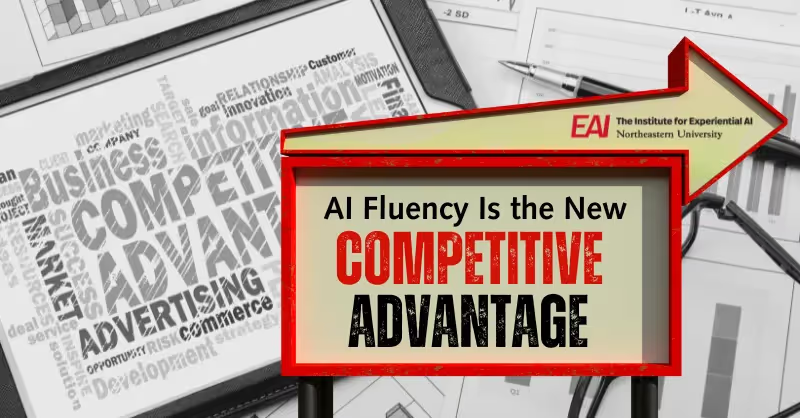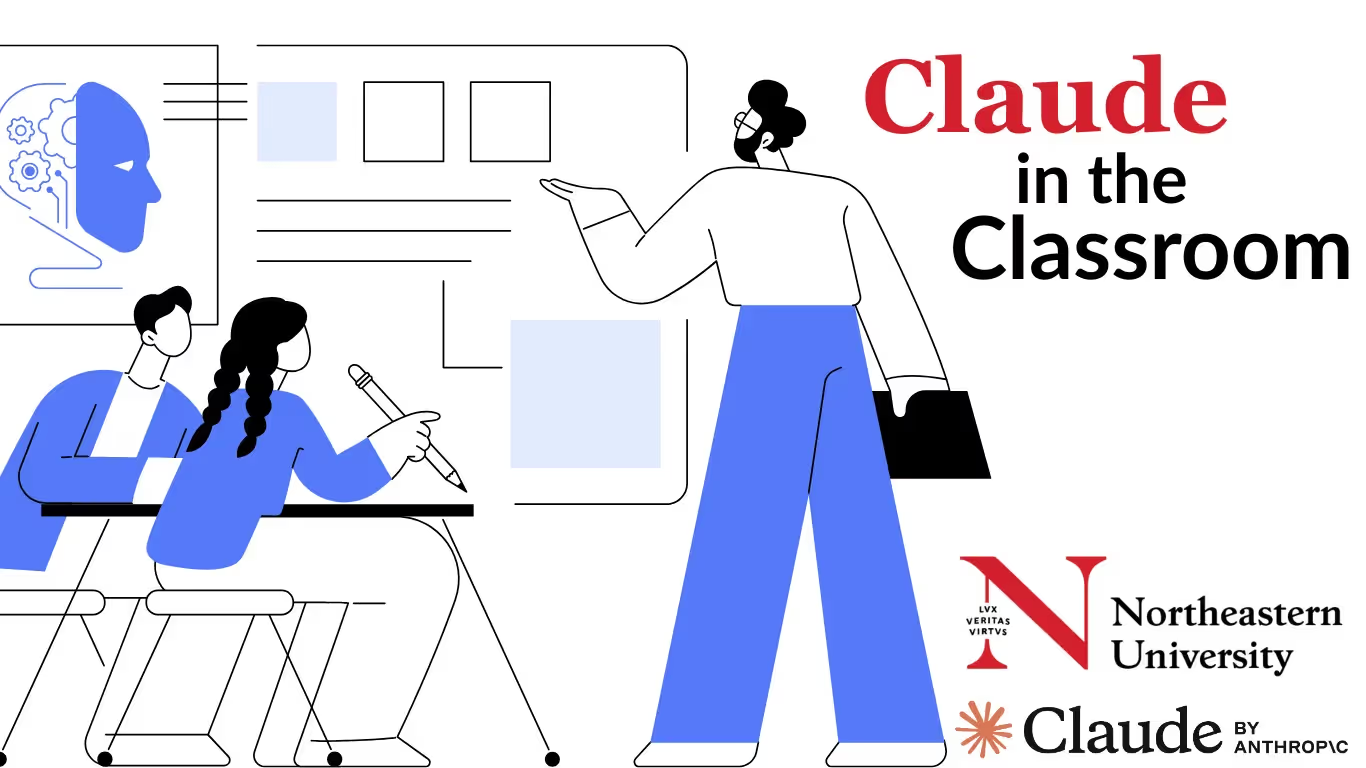Teaching Students to Lead In A Workforce Transformed By AI

How can students set themselves apart in a new age of AI-powered work?
Last week, Northeastern University assembled a lineup of experts to share their experience with artificial intelligence and help students understand where they fit in with the transformational technology.
The first-of-its-kind event, titled “AI in Action Week,” took place April 1-5 and offered students more than 40 expert presentations to choose from. The sessions gave students insights into how AI works, its limitations, the importance of using AI responsibly, and the myriad ways it’s already being used to augment human work.
Unsurprisingly, Institute for Experiential AI faculty and researchers played a central role in the week’s festivities, sharing insights from their work with organizations of all types to harness the technology’s potential.
“The theme is that we can’t ignore AI, because it’s going to lead to a similar, if not much larger, disruption than [digital transformations] of the past,” Institute Executive Director Usama Fayyad said in a presentation kicking off the week’s events. “It’s becoming almost essential that you use AI to cope with all of this data, because it’s so big and varied that no human can grasp it without these tools.”
Overall, presenters made clear that, while the workforce seems poised for disruption, AI also represents a once in a lifetime opportunity for today’s students to become tomorrow’s leaders. That’s because today’s AI systems work best with a human in the loop, or what the Institute calls “experiential AI.”
“We don't think that total automation of almost anything that we're doing as human knowledge workers is in reach of [artificial intelligence],” said Institute Director of AI + Life Sciences Sam Scarpino said in another talk titled, “Effective, Appropriate, and Responsible Use of ChatGPT in the Workplace.” “Instead, what we're thinking about is changes in the way we work. Hopefully those changes increase our efficiency or give us opportunities to work more effectively across a diverse set of areas."
The Nature of AI
The hype surrounding AI makes it easy to forget the technology has been with us in one form or another for decades. In his presentation, Fayyad walked through the history of AI, including the two “AI winters” in which overpromises led to severe drops in funding and research in the field.
“Despite much hype and fear, the results of AI were fairly limited in the first 40 years of the technology,” Fayyad said.
The field may have a checkered history, but Fayyad believes AI will bring major changes to how we work, likening its impact to previous digital transformations in the economy.
“Machine learning survived both ‘AI winters’ not because we have better algorithms, but because we have a heck of a lot more data,” Fayyad explained. “That is the game changer.”
The difference between a data scientist, engineer and analyst
Predicting how AI will change the workforce is made more complicated by the complex ways technology has already led to new jobs and hyper-specialization in recent years. In an April 3 presentation, Institute Senior Advisor for Strategy and Marketing Hamit Hamutcu tried to sort out the new landscape of work.
What’s the difference between a data scientist, a data engineer, and a data analyst? It turns out, even employers aren’t so sure. Hamutcu showed job descriptions for those roles can vary wildly. He also challenged audience members to go to their favorite job site and find as many titles as they could relating to roles in AI, data science, analytics, and machine learning. There were hundreds of results.
The exercise led Hamutcu into a discussion of research he conducted with Fayyad to find some core skillsets for each data-related position. The researchers surveyed thousands of data scientists, engineers, and analysts to understand which skills they use every day and contrast the different positions.
“Can we provide some standards as to what these [data science] roles mean so that Meta and other companies don’t take the liberty of defining them almost in random ways?” Hamutcu asked. “When we get under the hood, you see these disparate job titles converging a bit.”
Hamutcu showed charts with skillsets and examples for each job, revealing machine learning and data modeling, for instance, are more important for a data scientist than a data analyst. The session was especially relevant for students trying to navigate the data-related career landscape.
So how will the rise of AI affect these jobs?
“I do think some of these skills will be relegated to AI,” Hamutcu said. “Coding is structured. If you want to automate something, you look for things that are highly structured… Does that mean you shouldn’t learn any coding? Of course not, because we don’t know when that day is going to come, and employers will still need coders to build these systems. But I would just keep your skillset nimble.”
AI Pushes Human Frontiers
Throughout the week, experts shared inspiring stories about the new possibilities unlocked by AI. In the week’s opening keynote, Steve Chien, who works in NASA’s Jet Propulsion Laboratory, discussed how he’s using AI to make autonomous spacecraft better at collecting information in space and hunting for extraterrestrial life.
In a panel on AI and the ocean economy, presenters said AI is being used to understand changes in the populations of species, migration patterns, and the health of coral reefs over time.
The Covid-19 pandemic was also cited by multiple presenters as an example of a crisis that AI could help us overcome. Scarpino talked about using AI to help keep up with scientific research papers being published about the pandemic. And in a talk titled “Beating the Next Epidemic With AI,” Institute Research Scientist Ayan Paul described his efforts to build AI tools that make humanity safer and more resilient.
“We're pitting machines against viruses so that we can predict outbreaks, assess strategies, and monitor the efficacy of mitigation policies using AI," Paul said. "Imagine countless lives saved and minimal disruptions to livelihoods. That is what we are aiming for by simulating millions of possible scenarios of infectious disease outbreaks globally and identifying mitigation methods using explainable AI."
Presenters emphasized that explainability and fact checking is important. One of Scarpino’s presentations was on the responsible use of AI, a subject our Institute works on extensively. Responsible AI will only grow in importance as the technology is applied to more problems across society.
The presentations collectively made clear that AI is poised to transform the workplace, but the workers of tomorrow will also play an important role in shaping the future of AI.
“What inspires me about AI in general is the things I can’t even imagine yet,” said Institute Data Scientist Alexandrin Popescul, who spoke on the ocean technology panel. “What would I have thought soon after electricity was invented? I couldn’t have imagined all the potential uses of electricity we see today. AI is like electricity: it’s a transformational technology that unlocks a range of possibilities… Just like any powerful technology, in addition to excitement we also have to be responsible in how we use it and how it impacts humans and the environment. This is just the beginning.”
Want more insights from AI In Action Week? Stay tuned for recordings of the presentations!

.avif)


